- Details
AFAM met 2 apprentice students to talk about their experience as interns in the United States.
Matteo Maurice, apprentice student, industrial engineering, Paris and Fatima-Zahrae Msamri, apprentice student, mechanical engineering, Châlons-en-Champagne agreed to meet Albina, AFAM community manager to talk about their experience.
AFAM: tell us a few words about your American host company and how you found it.
Matteo: I am in my last year of the apprenticeship program at Arts et Metiers and I finished my 3-months internship in the United States last summer which was a requirement to get my Arts et Metiers diploma. First, my current French company (GYS) offered me an opportunity of an internship in one of its subsidiaries in Europe (Great Britain or Italy). But at the same time, my company in France had a contact of one of their clients in the United States based in California who needed an engineer to implement some production tools. This is a very small company. That's how I was put in contact and found this internship opportunity in the United States.
AFAM: Did you continue your contract with your French company while you were pursuing your 3-months internship in the US?
Matteo: No, I did not. I did what we call "mise en veille" of the contract with my French company. This "mise en veille" document both in French and in English was signed by all parties ( CFA - centre de formation d'apprentis, French host company, American host company and myself).
AFAM: did you and your company need to sign an internship agreement (convention de stage)?
Matteo: No, there was no such document to sign. Another document the American company prepared and signed was a DS-7002 ( training plan) which I needed to get the J1 visa.
AFAM: what sponsor did you work with? How did your American company handle it?
Matteo: I worked with CIEE ( its representative in France is Paranthese Paris). It went well. The company had a sponsor's virtual visit as they never had any J1 interns before. After my company proved their eligibility to get a J1 intern ( they needed to fill out and sign a DS-7002 form besides sending other papers), it was my turn to send all the papers from my side ( DS-2019, school certificate, my resume etc.). Then I took an appointment at the embassy and was ready to get my visa but there was a problem with my SEVIS registration ( which is very rare) and that's why it took me more than expected to get my J1 visa.
AFAM: do you have a piece of advice to give to others to avoid if possible any delays?
Matteo: yes, sure. First of all, please start all the visa procedures in advance ( 3 months in advance is what I advice). Then, in my case I felt like, when all the fees were paid, the procedure slowed down. So once you choose a sponsor, pay all the fees and send all the paperwork, try to be in touch with your sponsor and ask for updates all the time.
AFAM: Hello Fatima, and thank you for being with us! Could you please tell a few words about how you found an internship in the US and what was the role of your French company in it?
Fatima: as to me it did not happen at all as in Matteo's case. My French company did not have any opportunities abroad for me to help me validate my international mobility at school. But at the end of the day, it was still my French company that helped me. While talking to my HR manager, she offered me to send my resume to one of her managers and that's is how my resume ended up at some desk in the US. I was contacted by one of the managers from Hutchinson USA interested by my profile. Then I was interviewed and accepted for 3 months internship.
AFAM: Did your host company in the United States signed the same papers as in the case of Matteo?
Fatima: No, we did not deal with "mise en veille" contract though I was expecting it. I was not paid by my company in France during those two months but we did not use the "mise en veille" agreement. On the contrary, all three parties ( myself, French and American company) signed a French "convention de stage".
AFAM: Was is something unusual for an America company to be obliged to sign the "convention de stage"?
Fatima: They did not expect that but signed without any problem as I needed this paper to validate my international mobility. I was a bit stressed out as my paperwork process was not as quick as I wanted it to. But at the end of the sday, I got my visa on time and was able to start my internship as planned.
AFAM: Who paid all visa, a company or you?
Fatima: I paid only SEVICE and visa fees and my company paid the sponsor which was French American Chamber in my case. The sponsor was chosen by the company. FACC is its long-term partner.
Matteo: and I paid the whole invoice which Paranthese Paris sent. So, the company did not pay any visa fees at all. But my salary allowed me to to pay those fees.
AFAM: how did your installation happen? Did you have any problems with housing and a car? How did you deal with them?
Matteo: I managed to rent a house which I share with two other people. The website I used was craigslist.org. We met online with on of the renters and I felt that it was a good solution. Finally, I was right. And I stayed there for the duration of my internship.
I had more problems to rent a car as below 25 year old it is very expensive to rent. So at the beggining one of my collegues helped me with the ride and then my company help me find a cheaper car renting option.
Fatima: in my case, everything was taken care of by my host company. I could rent my car I used for the duration of my internship right at the airport and a hotel was provided and paid for me by the company.
AFAM: were you able to travel, combine your work with sightseeing during your stay?
Matteo: I lived and worked in Rohnert Park in California and had a pleasure to travel to San Francisco and see the city. I also could travel a bit in California and went to Los Angeles to see my host company's clients. But time was flying and actually you do not have a lot of time left when you are pursuing a 2 months internship.
Fatima: my internship took place in Newfields, New Hampshire. Life on the West Coast is a dream. I was very grateful to visit Boston and New-York many times and I was able to adapt quite easily to American culture. I used to work on site during the week, but I tried to travel each week-end to discover new places, which allowed to make new friends and meet new people. Admittedly, this three-month adventure have passed very quickly, but it was very interesting and I tried to enjoy every single moment of it.
AFAM: thank you very much for this interesting conversation and for your time.
More about Shasta program offered at AFAM for students and apprentices
More about apprenticeship in France: here
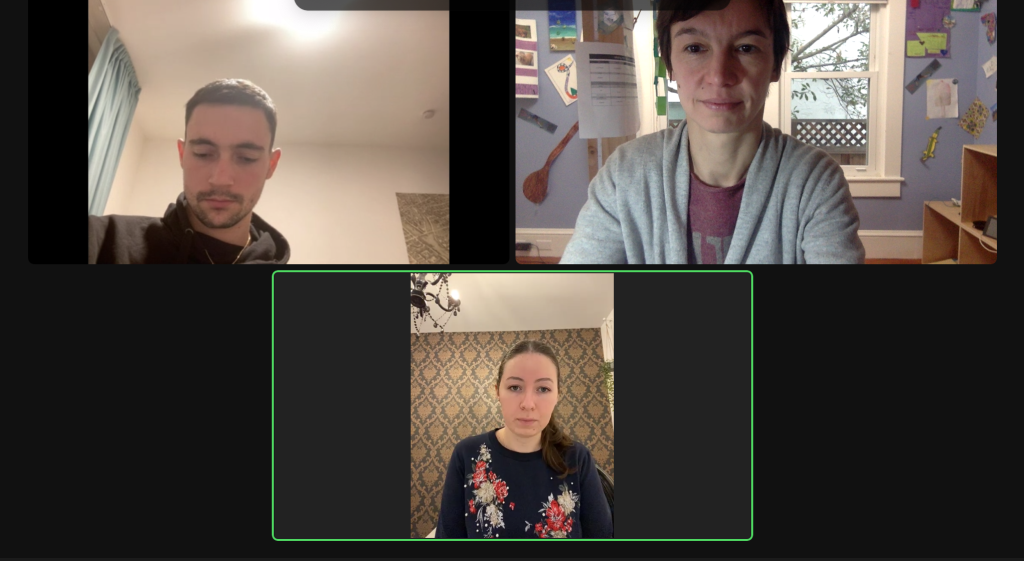
- Details
Goodbye 2022 and hello the new 2023! What did 2022 bring to Arts et Metiers community in the US, to the school, la SOCE and the Foundation?
Let's look back and recall some important events of the past year.
January 2022
Thierry Lucotte ( Cl 77) is elected president at la SOCE
February 2022
AFAM launched a new Yosemite program for gadz'arts entrepreneurs
Laurent Champaney renewed his mandate as Arts et Metiers president
March 2022
Arts et Metiers and Karlsruher Institut für Technology (KIT) celebrate 25 years of partnership
April 2022
First gadz US Energy network in-person gathering took place in Houston
AFAM organized an online event to talk about American visas
AFAM took place in Arts et Metiers entrepreneurship ecosystem meeting
May 2022
AFAM organized BBQ and pool party in Saratoga, CA
June 2022
In May and June 2022 Arts et Metiers campus in Aix-en-Provence welcomed 43 Texas A&M students participating in study abroad program
July 2022
Bordeaux campus welcomes 21th Ariane cities summer school
August 2022
Arts et Metiers parcours US students arrived in the US for their master's year in one of American Universities
September 2022
Aix-en-Provence campus has a new director - Féthi Ben Ouezdou and opens its MediastiAM space
October 2022
AFAM launched a new Sequoia program for Arts et Metiers studetns and alumni
November 2022
AFAM participated in International Week
AFAM community manager visited Paris, Lille and Châlons-en-Champagne campuses to meet students and teams
December 2022
La Fondation Arts et Metiers launched L'Esprit Sorcier TV
- Details
Carla is one of three American graduate students on Paris campus pursuing a Biomedical Engineering Master 1 BME. AFAM community manager Albina met Carla online to talk about her motivation to join the program in Paris as well as her life in Paris.
AFAM: Hello Carla and thank you for taking the time to meet me today. You’re a Biomedical Engineering master’s degree student at Arts et Métiers. You are American and did your bachelor’s at UCLA. How come you decided to pursuit your biomedical engineering master’s program in France? How did you find this option and decided to leave California for Paris?
Carla: I got very lucky in the sense of I knew I wanted to do biomedical engineering. And so I had been researching different master's programs available both inside and outside of the States because I knew I was not committed necessarily to staying in the US. I happened to google "biomedical engineering Paris" and essentially the name of the program is "Paris biomedical engineering" and so it came up. I did a bit of the research and I found out that this program was exactly the type of the program I'd love to do as my masters. The program is in English which for me was... I would not say not negotiable...but I would be very hesitant to do it in a different language because I've grown up doing my studies in English. It being in English was definitely a big plus for me.
Besides, I really, really like the program. That what motivated me to pursuit it because in the last year of my bachelors I had done a couple classes that had me explore biomedical field. I realized that it was the field that I wanted to enter. But it is a very big field, so I felt like in this master's program you had the opportunity to try every aspect of it while also being able to specialized in a specific area which is what I really appreciated.
AFAM: were you looking for a program precisely in France, or even Paris in particular?
Carla: yes, my parents are French and I thought France would be a good country to go to. I have some connections there. And then I looked at Paris because from what I know of engineering programs, the ones I was familiar with were in Paris.
AFAM: do you think some of your UCLA classmates willing to go abroad for a master's program, would chose to go to France?
Carla: it is a very interesting question. Going into the program I had not realized how inexpensive it was. I probably would have talked about this program with my other classmates. When you are in Los Angeles, life is very expensive on top of tuition. The fees can definitely motivate more American students to come. Being in Paris for me is a blessing. In masters there is not a lot of financial support you would have with your bachelors. A lot of American undergraduate students would go to industry and then do their masters in industry with their companies because they know they can be paid. Besides, I feel like in the United States undergraduate students will only be looking into masters' programs in the US whereas in Europe students tend to go international.
I was thinking about Canada at first. But being in Europe is completely different. Telling students about the masters early on in their undergrad program would definitely give them an idea to think about it. From what I've heard from other American students in Paris, French visa is not difficult to get. I think integrating in the city is a bit harder regarding housing and banking, for instance. And it might be difficult if you have no one to help you with. But overall, going to France for a master's degree might be a very good idea.
AFAM: did the school help you with student "onboarding"?
Carla: the school does not provide much of that, at least not that I know of. My mom happened to be in France visiting family when I found out that I was accepted to Paris biomedical master's program. And she took a couple extra days in Paris to set me up with a bank account and look for housing. The hardest part for the housing is that we do not have an income in France. And the situation with dorms is complicated. Half of my class got into the dorms. I applied for ENSAM dorm and I did not get in. I think it depends if you get lucky.
AFAM: do you think more undergrads would be interested in getting into Paris Biomedical master's program (for instance at UCLA) if the program is known?
Carla: yes definitely, my recommendation would be to contact Outreach or International department to advertise the program and pass on information to students. The other avenue you would potentially take is to go through students' organizations (for instance ASME for mechanical engineering at UCLA). Besides, most campuses have networking clubs.
AFAM: Carla, you were growing up speaking French. Do you think American undergrads not speaking French at all might be at ease pursuing the program?
Carla: I have 2 more Americans in the program with me. They do not have difficulties pursuing the program as it is in English. But I think it might be challenging in every-day life in Paris if you do not speak the language. One of the international students I know learned the language a few months before and clearly has a gift for learning languages. Others might have more difficulties with the language. If you came to France not just to study, but also to travel and explore, make friends - you might need to put more effort into learning the language.
There is very wide range of levels coming in and the program for learning French for the M1 does not correspond to everyone. So, I would definitely recommend outside sources or a different way for learning the language.
AFAM: any other difficulties integrating the French system you'd like to mention?
Carla: The French system is different in terms of grading. In the US, at least in high school, the way you test and evaluate the performance is different. The way that teacher teach is very different too. One of my French teacher asks a lot to go to the board and solve the problem. If you've never had a teacher ask to do this before, it can be overwhelming.
AFAM: do you think it would be good to offer a cultural class to students before the programs starts?
Carla: oh yes, I think it would be helpful. As to me, I already spent some time in France and I already knew what to expect, what to look for, how to live in a big city (I lived in LA before). But yes, speaking about the Parisian life, I think one of the biggest questions for me was where to buy things. In the US you have CVS or Walgreens for certain products. In France some places would be an equivalent but some places would be completely different. For me it took some time for those little things to figure out. Buying groceries is very different: boucheries, les marchés. For those who do most of their grocery shopping at Safeway or Trader's Joe, it would be interesting to learn where to find stuff. It might be a bit of a culture chock if you never experienced it before.
AFAM: What did you enjoy (are you enjoying) in your current Parisian life? How do you spend your weekends? And what do you miss back in the US?
Carla: the sun (laugh). We are hitting 5 degrees today. Layering (laugh)... As to my weekends, I live near rue Mouffetard in the 5th. It is a very nice area. Jardin des Plantes has its Festival of Lights this time of the year. And there are giant insects there. I walked in the other day not knowing what they had and there was a giant spider in my face. Oh Gosh (laugh).
I joined a boxing gym for fun. I like to stay active. I think it was really the hardest part for me is to find place to go running or playing soccer. I used to live in California where it is always good weather to go play soccer or work out outside, just find some grass.
I also go visit. I've been to Bordeaux, to Lyon. I was supposed to go to Vosges this weekend but there are transportation strikes. It was a little bit tricky because all the news is in French and it were my grandparents who found out about strikes, not me.
AFAM: thank you Carla for your time and for sharing your experience with us. Happy holidays!
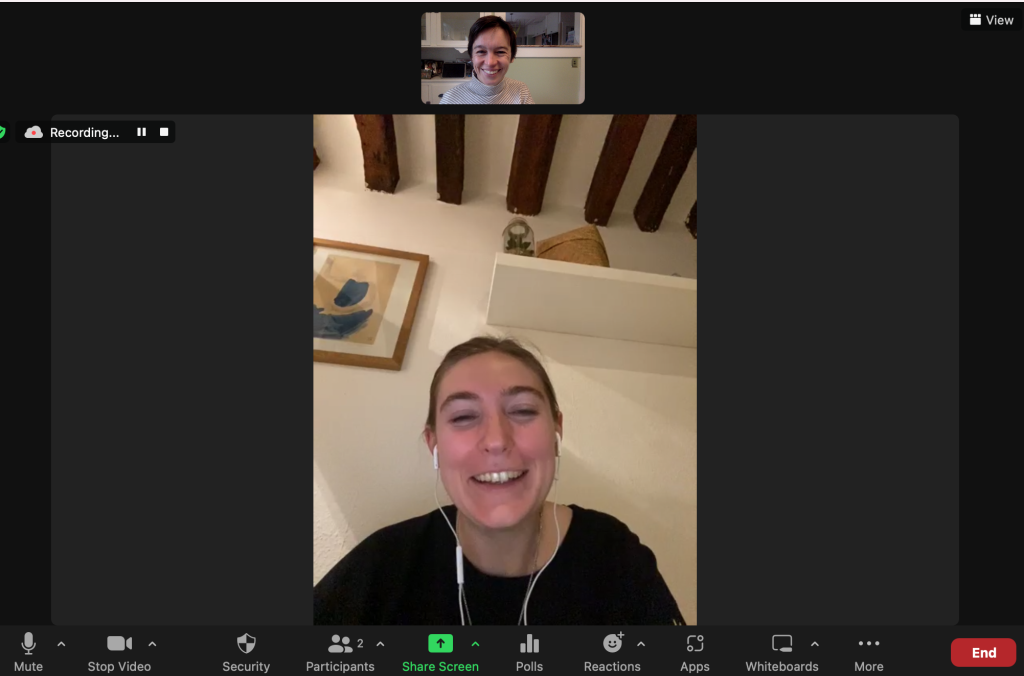
Albina, AFAM community manager, interviewing Carla via Zoom
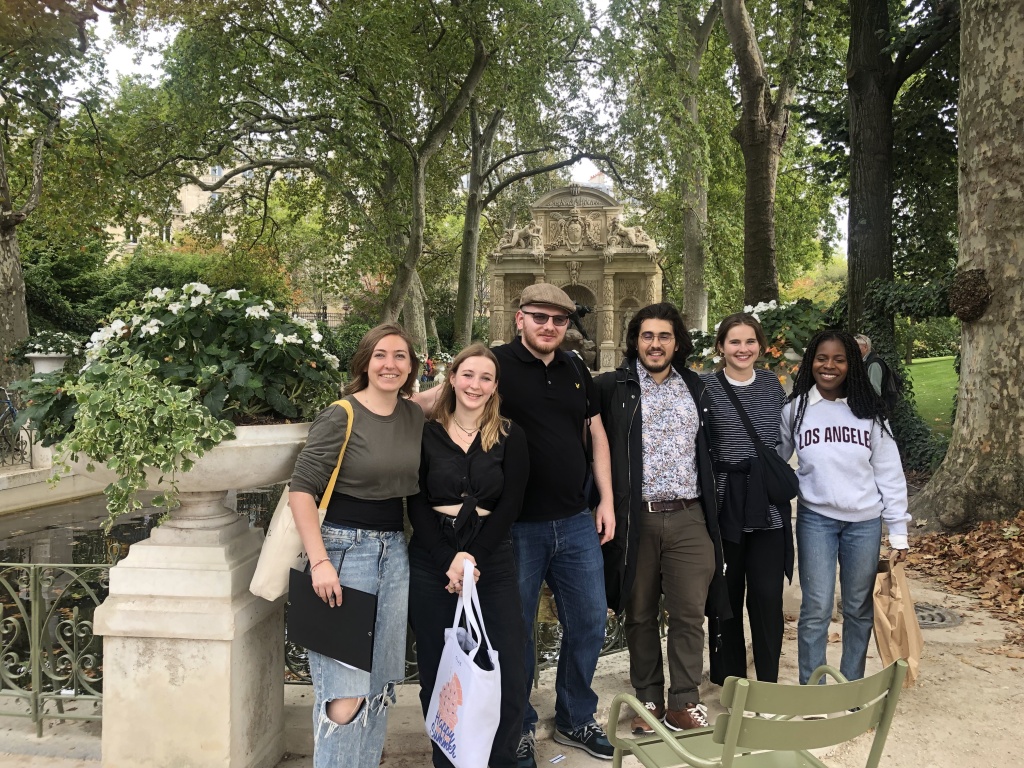
Carla (on the left) with other master's students in Paris
- Details
Every year in the fall ( except for the pandemic 2020 year) AFAM community manager visits the school campuses to meet students, faculty members and administration staff to talk about AFAM and its programs.
This year Albina visited Paris, Lille and Chalôns-en-Champagne campuses. The visit coinsides with the annual International Week organized by the school.
AFAM is grateful to Lille, Paris and Chalôns-en-Champagne teams, especially to Caroline Bauduin, Florence Lesage, Delphine Luchez, Pierre-Yves Rohan, Arnaud Jérôme, Daniela Stelmaszyc and of cause to AFAM board member Audrey Stewart, for helping organize the visits. AFAM is committed to working closely with the school and La SOCE to help our students succeed in their American journey whether it be an internship or studies.
AFAM would also like to thank our student Lancelot Danne (Li 219) and our alumni Aymeric Wang (Cl 219), Claire Dorin (Class 2000), Benoît Binet (An 205), Patrick Durrmann (Me 206) and Eymard Prevost (Li 215) for taking the time to share their American experience with Paris, Llille and Châlons-based students.
We are looking forward to participating in the next meetings and events with our students and alumni!
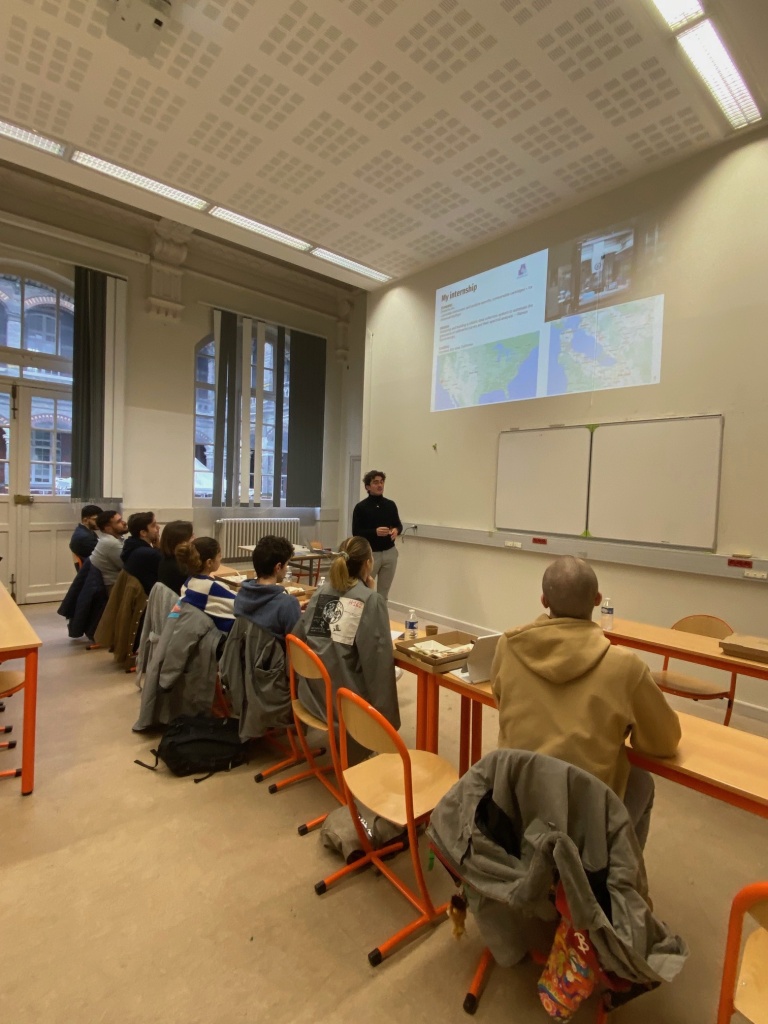
Lancelot Danne (Li 219) talking to Lille students
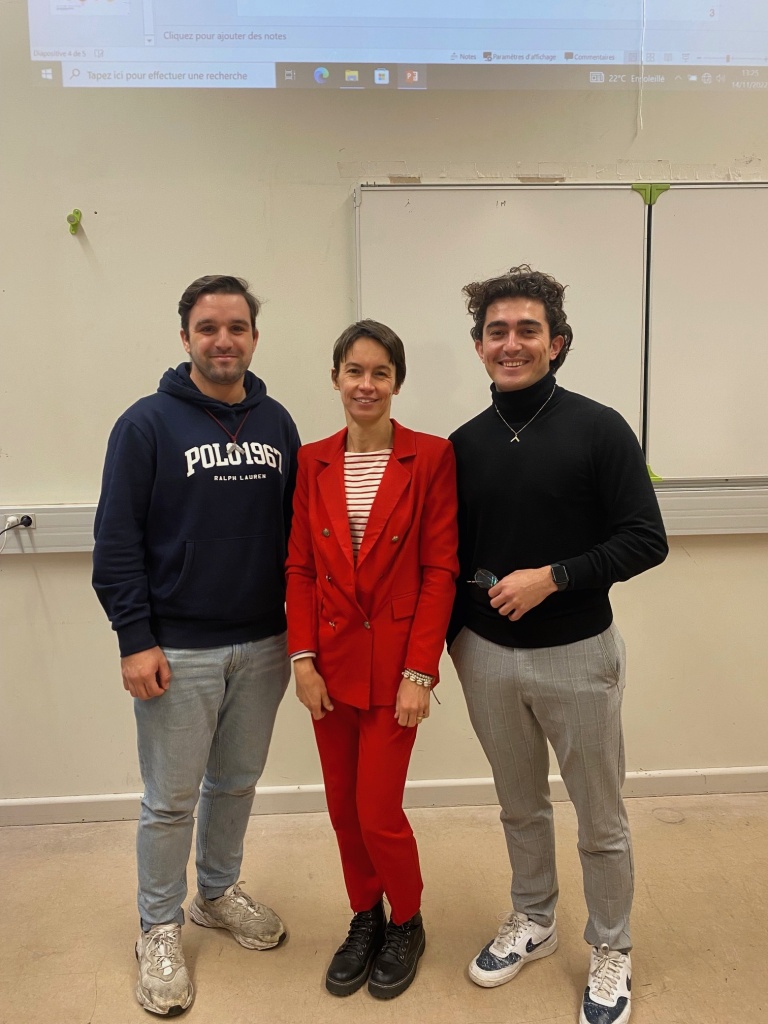
Albina with a former Shasta intern Lancelot Danne (Li 219) and a current Shasta intern Guillaume Paris (Me 220) in Lille
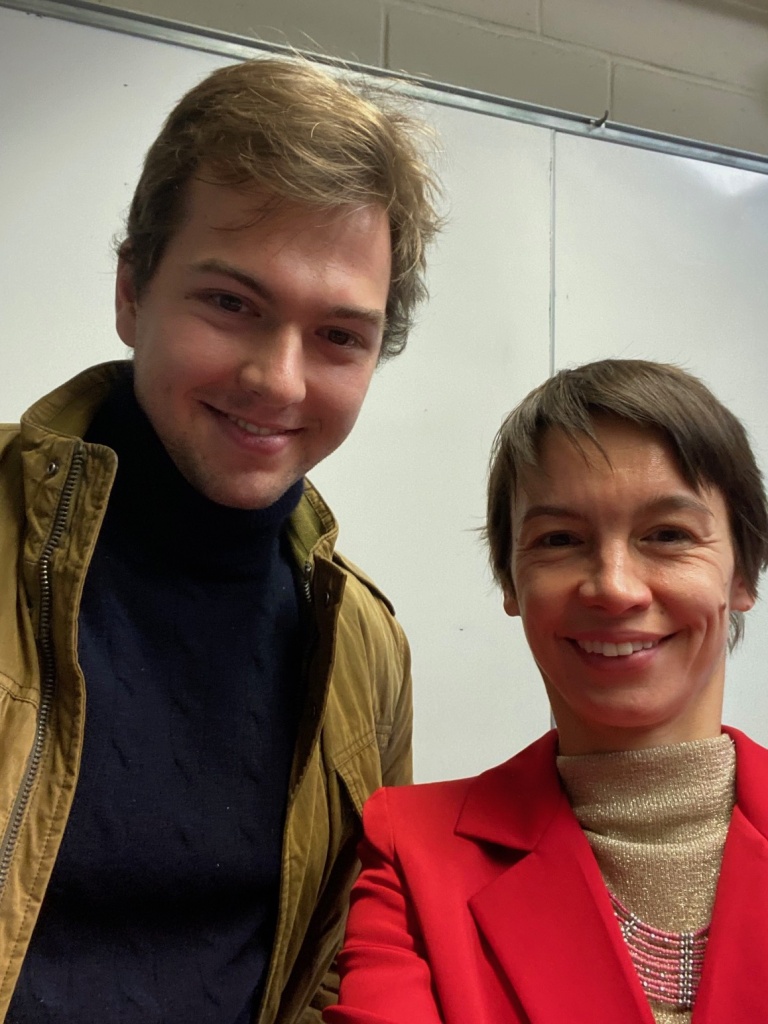
Albina and Aymeric Wang (Cl 219) after the meeting with parcours US students
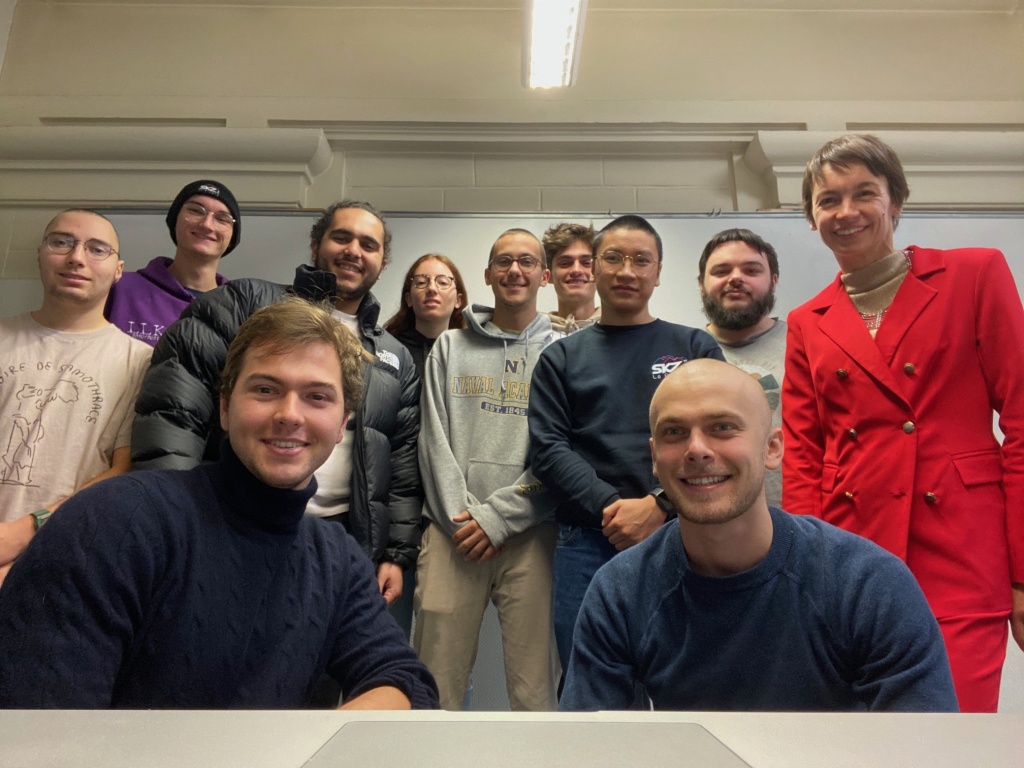
Aymeric, Albina and parcours US students
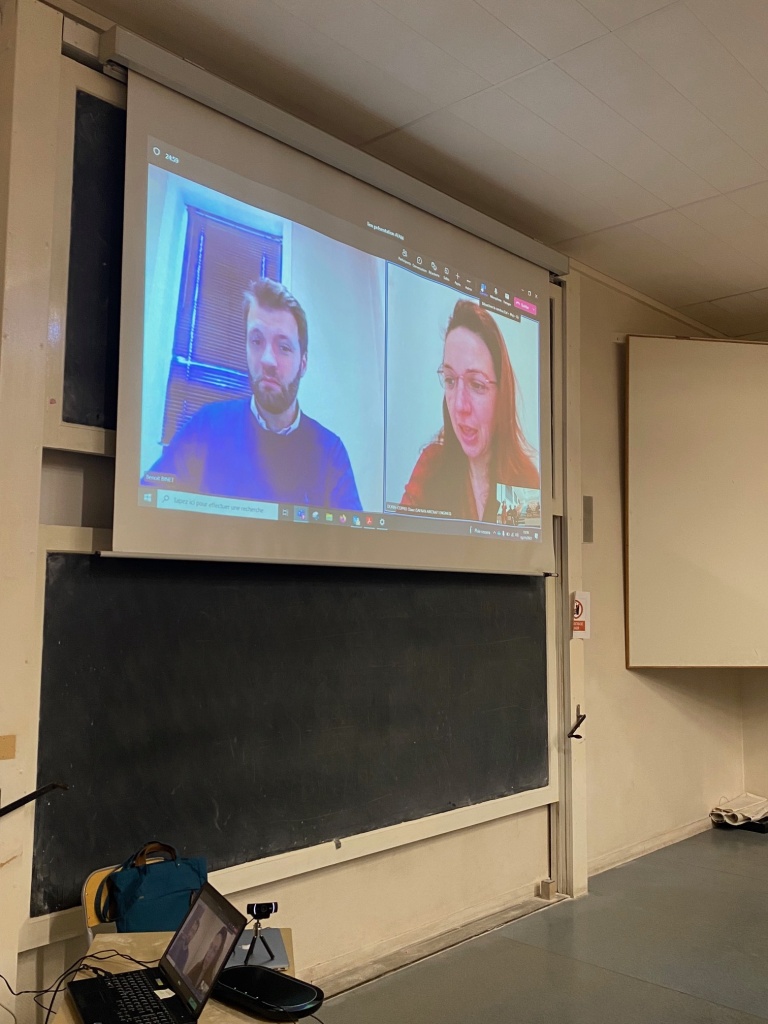
Benoît Binet and Claire Dorin talk to Paris-based students about their international experience
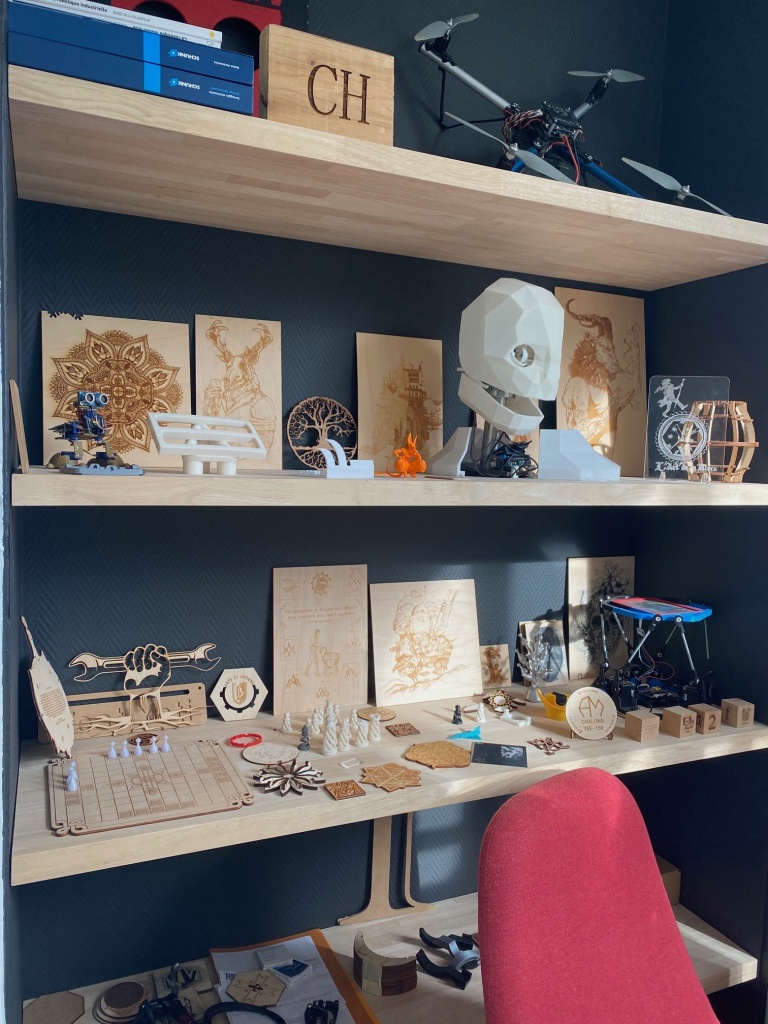
Students' artworks, Châlons-en-Champagne campus
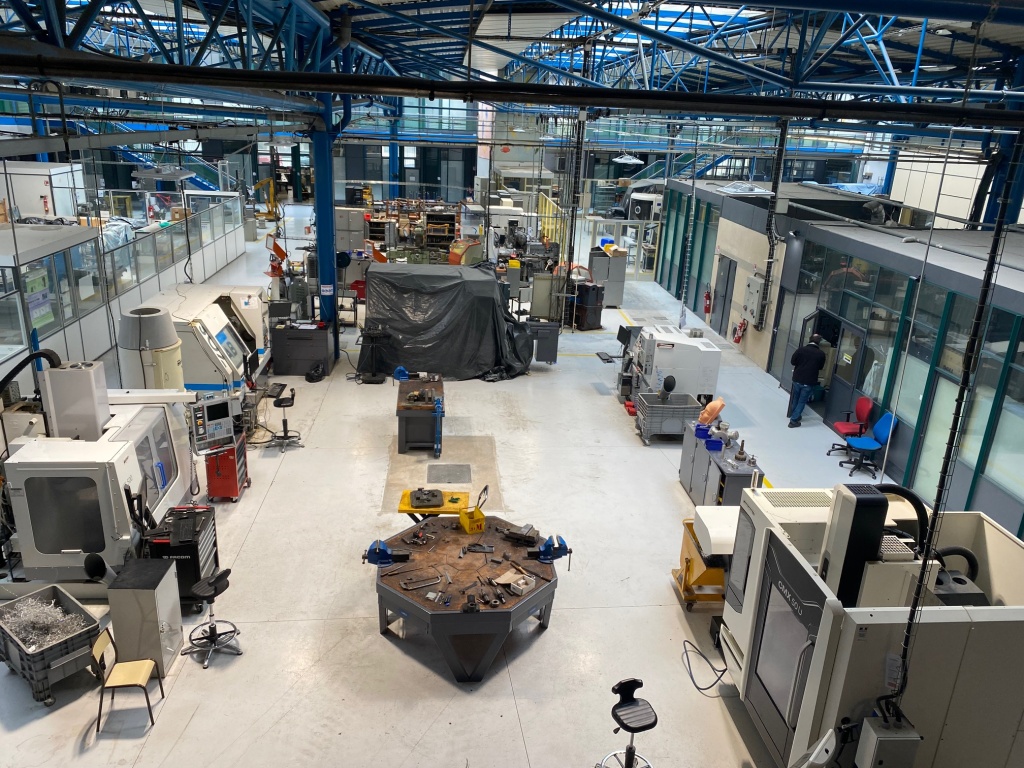
MSMP laboratory, Châlons-en-Champagne campus
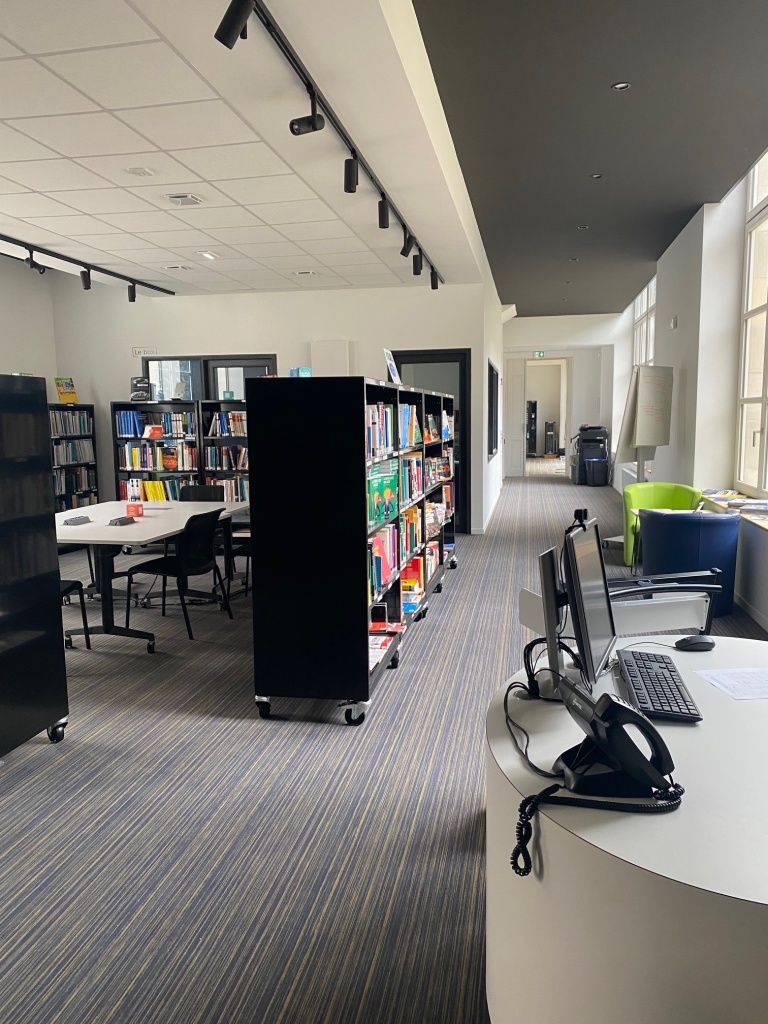
Library, Châlons-en-Champagne campus
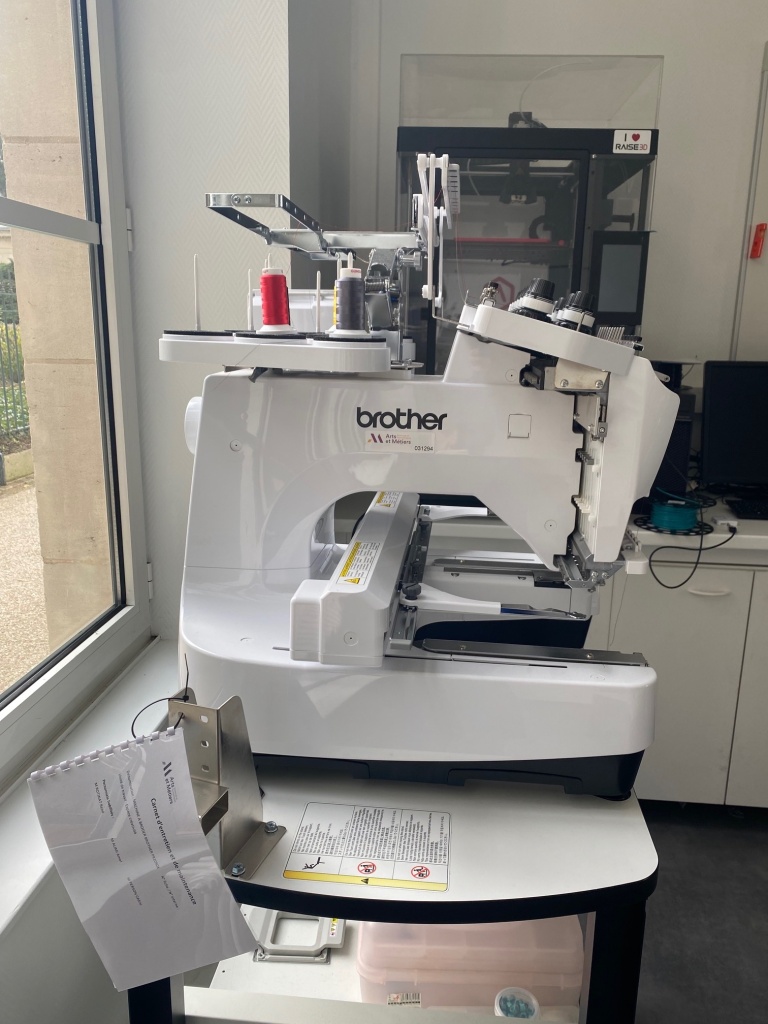
Embroidery machine, Châlons-en-Champagne campus
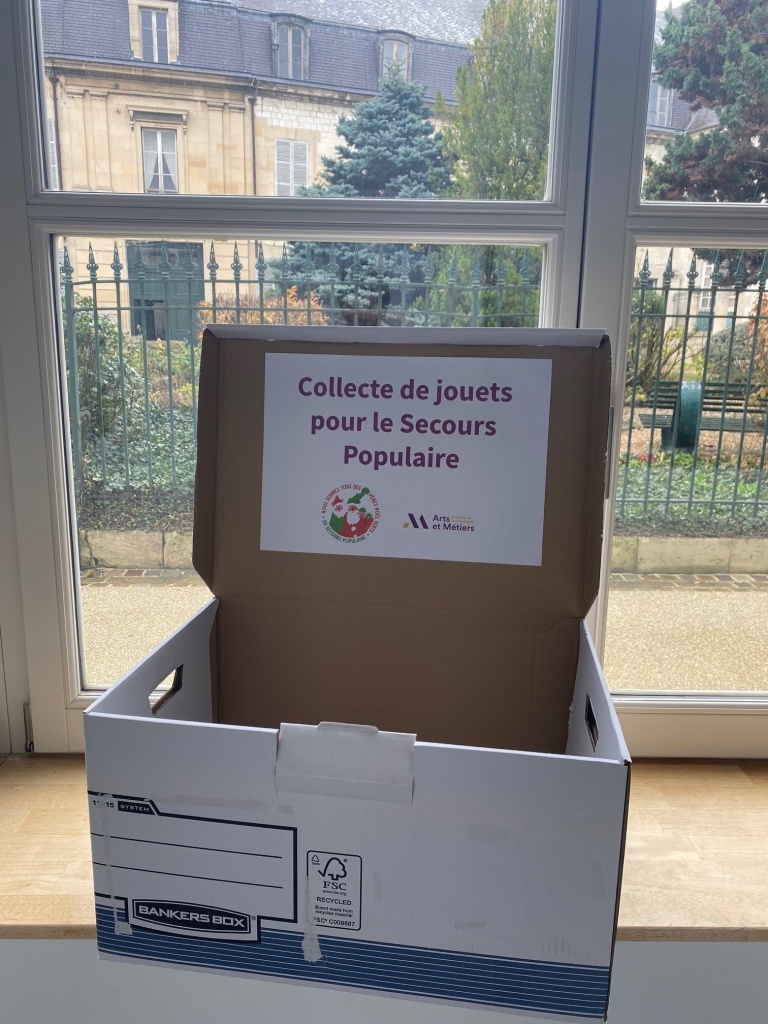
Donation box, Châlons-en-Champagne campus
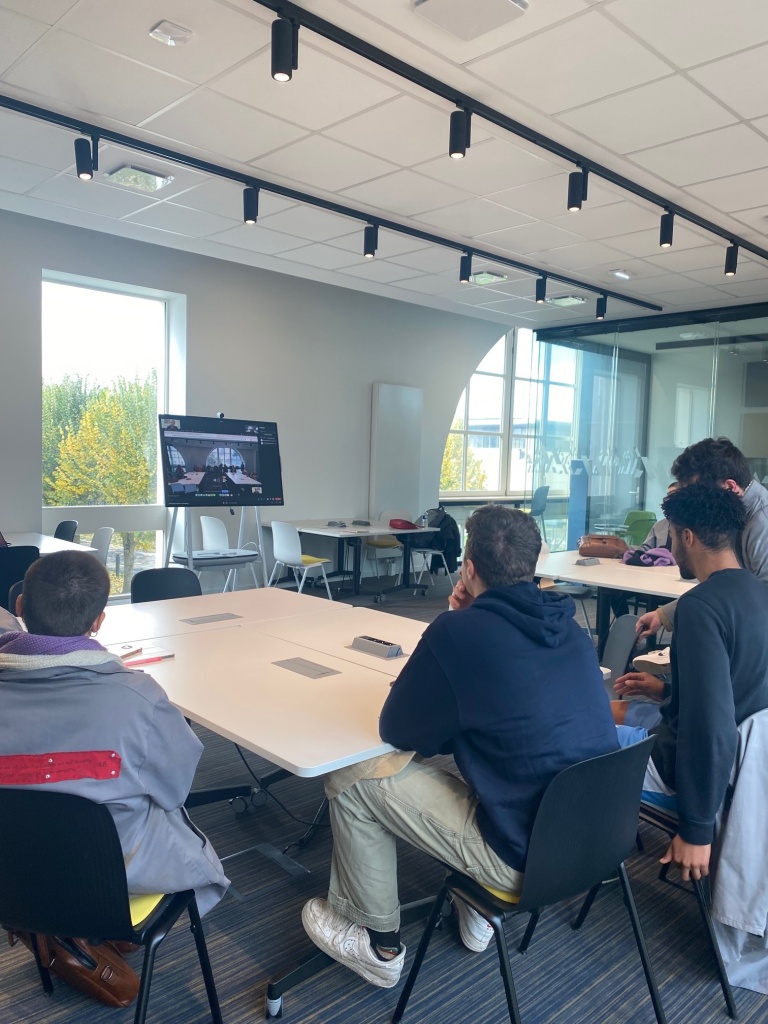
Students at the AFAM conference with Albina Patou-Chebykina, Patrick Durrmann and Eymard Prevost, Châlons-en-Champagne campus
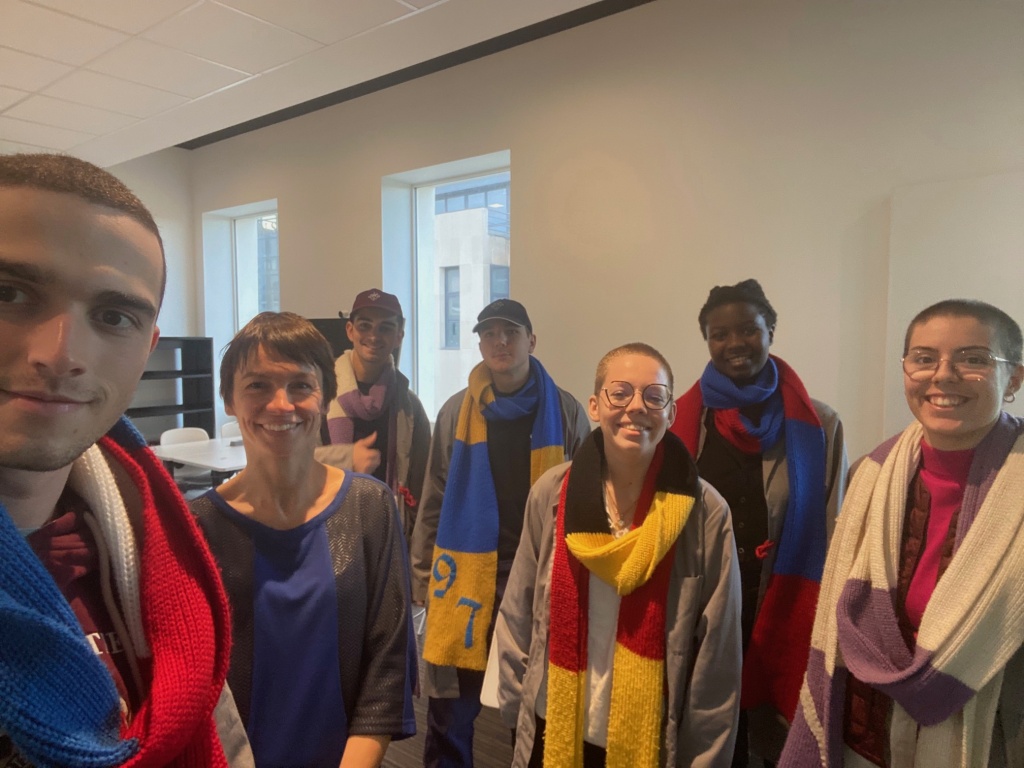
Châlons-based students together with AFAM community manager
- Details
It became a tradition. Every fall AFAM is invited to present its programs in front of students in an online conference during The International Week. This whole November week ( in 2022 - Nov. 14- Nov.18) the school invites alumni and students to speak about their different experiences of studying, pursuing an internship or working abroad.
This fall the AFAM presentation occured on Friday, November 18th. More than 30 students could participate in this evening 45-minutes conference and ask AFAM guest speakers questions. Among guest speakers were AFAM community manager Albina as well as AFAM volunteers and Arts et Metiers alumni Jean Pommier (An 183), Nicolas Horde (Ai 214) and Valentin Fehr (Cl 212). The virtual presentation was especially prepared for Aix-en-Provence, Angers, Bordeaux, Cluny and Metz students as students from Paris, Châlons-en-Champagne and Lille campuses could meet AFAM community manager in person and assist at AFAM conferences and workshops on campus earlier that week.
You can read more about Albina's campuses visits in our next post.
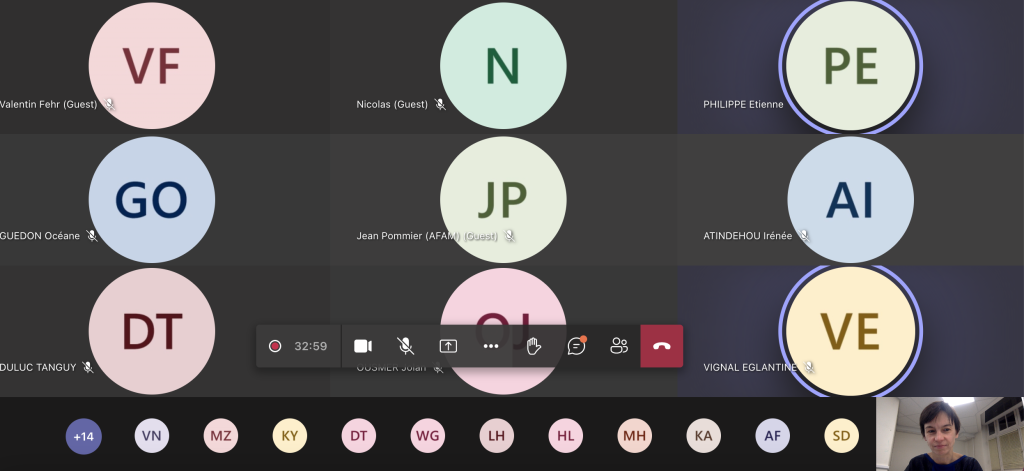
Image: a screenshot of the AFAM online conference given at the end of the International Week organized by the school

 BLOG /
BLOG /  CALENDAR /
CALENDAR /  DONATIONS /
DONATIONS /  MENTORS /
MENTORS /